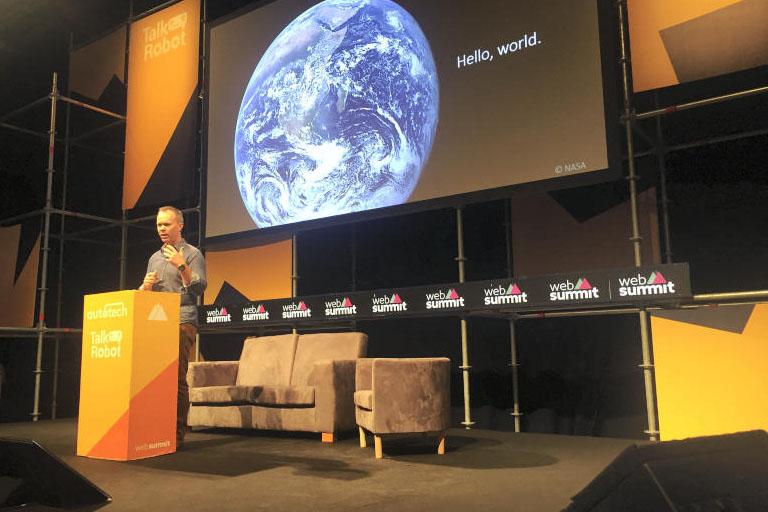Speaking at the Web Summit in Lisbon on Wednesday, the Canadian entrepreneur, Scott Larson, explained the technology behind Helios Wire, a new startup, which aims to make the earth better through space.
“We are building a space-enabled internet of things network; what that means is that we have Spectrum. Spectrum is the right to send data from earth to space. It’s incredibly rare. Its incredibly valuable and we have a tonne of it,” he told those gathered at the auto-tech stage.
Larson, who is CEO of the company, stressed how this can help with farming. At the moment, farmers are using sensors, which are stuck into the ground to measure pH, moisture and fertiliser content.
How Helios Wire works
“With our technology, you can have the data from that technology sent to space, through the satellite dishes, on to a cloud and when the farmer gets it, he can upload it to his tractor in more or less real time,” he said.
The technology works by using satellites in space that pick up beeps from tags the size of your phone that will be placed on objects around the farm. One satellite will pick up the beeps every 12 hours. Larson aims to have 30 satellites, 600km up in space.
“In the past, farmers would look at an area and ask ‘is this area ready to plant?’” he said. “If you put sensors in an area, it’s no longer this farm, this area, this field. It is now this 100m, this 20m and you can end up farming to the individual plant.”
“What does this single plant need in order to be most productive? It’s a powerful statement,” he added.
Larson previously co-founded UrtheCast, a company that signed an agreement with the Russian Space Agency to install cameras on the outside of the International Space Station. Russia took the data from their company to help with things like forestry, farming and mapping.
He intends to have the first two satellites in space by 2018 and in another 18 months launch the next satellite, until he reaches 30.
Read more
Smart technology for farming at Web Summit
Speaking at the Web Summit in Lisbon on Wednesday, the Canadian entrepreneur, Scott Larson, explained the technology behind Helios Wire, a new startup, which aims to make the earth better through space.
“We are building a space-enabled internet of things network; what that means is that we have Spectrum. Spectrum is the right to send data from earth to space. It’s incredibly rare. Its incredibly valuable and we have a tonne of it,” he told those gathered at the auto-tech stage.
Larson, who is CEO of the company, stressed how this can help with farming. At the moment, farmers are using sensors, which are stuck into the ground to measure pH, moisture and fertiliser content.
How Helios Wire works
“With our technology, you can have the data from that technology sent to space, through the satellite dishes, on to a cloud and when the farmer gets it, he can upload it to his tractor in more or less real time,” he said.
The technology works by using satellites in space that pick up beeps from tags the size of your phone that will be placed on objects around the farm. One satellite will pick up the beeps every 12 hours. Larson aims to have 30 satellites, 600km up in space.
“In the past, farmers would look at an area and ask ‘is this area ready to plant?’” he said. “If you put sensors in an area, it’s no longer this farm, this area, this field. It is now this 100m, this 20m and you can end up farming to the individual plant.”
“What does this single plant need in order to be most productive? It’s a powerful statement,” he added.
Larson previously co-founded UrtheCast, a company that signed an agreement with the Russian Space Agency to install cameras on the outside of the International Space Station. Russia took the data from their company to help with things like forestry, farming and mapping.
He intends to have the first two satellites in space by 2018 and in another 18 months launch the next satellite, until he reaches 30.
Read more
Smart technology for farming at Web Summit





SHARING OPTIONS